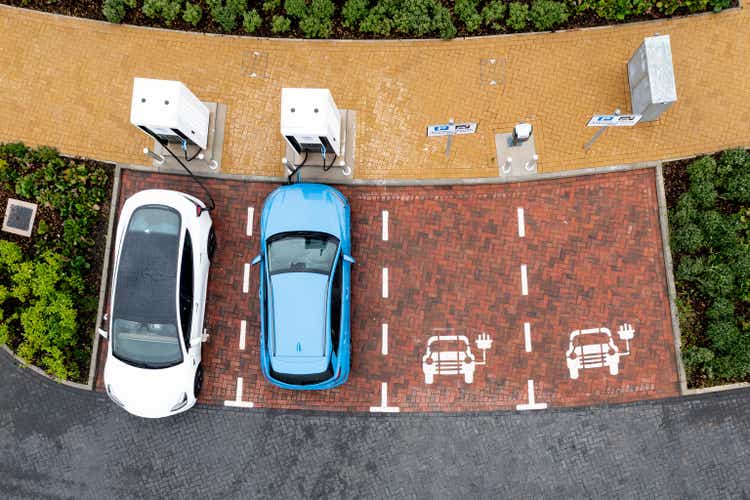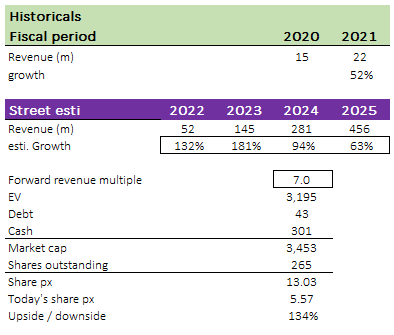Teamjackson
Recommendation
I believe the selloff is unwarranted, and the current share price for EVgo, Inc. (NASDAQ:EVGO) presents a good upside. The increasing need for EV charging networks, coupled with the rapid growth of the overall EV market, makes the EV charging market an attractive one. The company has developed and implemented a software-controlled DC fast charging station architecture that is expected to reduce upfront capital costs and ongoing operating costs, maximize return on investment, increase operational flexibility, and reduce operational risk. Furthermore, the company differentiates itself from its peers by being both an owner and operator of charging infrastructure.
Business
EVgo provides a network of public electric vehicle (EV) fast charging stations.
There will be an increasing need for EV charging networks
The growth of the overall EV market, which has been rapid as of late, is crucial to the success of the EV charging market. I believe that market growth will speed up in the future because of things like more EV models and better performance, a lower total cost of ownership, longer ranges and more chargers, and many other positive trends. This is supported by estimates from experts – In 2040, Goldman Sachs predicts that electric vehicles will make up more than 80% of all new vehicle sales.
The auto industry and battery manufacturers have increased production of EVs across a broader price range and created batteries with higher efficiencies and lower costs to meet the anticipated demand for EVs. Despite the fact that these initiatives have already reduced EV entry prices, I anticipate further reductions in the coming years. As the price of EVs as a whole drops, more EV makes and models should achieve total cost of ownership parity with their ICE counterparts.
Widespread EV adoption will call for more than just lower prices and TCOs; however, it will also require consumers to have faith in the vehicles’ range and charging infrastructure, as well as an expanded selection of vehicle types. As battery technology improves and prices decrease, I anticipate an increase in the range of EVs. I think that future EVs in the SUV, CUV, and pickup truck markets, along with longer ranges, will make EVs much more accessible and speed up their adoption.
Modifications in policy and shifts in consumer behavior have both contributed to the growth in interest in EVs. For instance, President Biden has aimed for a 50% share of EV sales by 2030. In my opinion, the adoption of EV fleets will be greatly sped up in the coming years as a result of such regulations, as well as the trend toward car sharing and mobility as a service.
Proprietary technology architecture to meet increasing charging requirements
EVGO has designed and implemented a software-controlled DC fast charging station architecture in conjunction with the charger manufacturing industry. This architecture permits the management and control of modular power units via software. Since this allows for the dynamic sharing of a charger’s output among multiple vehicles, I believe it will play a significant role in EVGO’s future growth. In the future, the company plans to implement this technology because management believes it will maximize return on investment, increase operational flexibility, and decrease operational risk, among other benefits (as mentioned in the S-1 filing).
In my opinion, EVGO’s innovative layout makes it suitable for the charging needs of numerous different electric vehicles. Increased charging speeds, more power available, variable energy and demand management, prioritized access, and timed charging are all part of this. Throughput, asset utilization, and the ease of future power augmentation can all be improved if the company can eliminate points of failure and improve the availability and reliability of its chargers. EVGO can offer more useful services, and because of this, the learning rate benefits and cost reductions of charging hardware can be seen sooner.
EVGO differentiates from peers as it is both an owner and operator
I anticipate that the already rapid expansion of the American EV market will quicken as more and more people and businesses adopt EVGO’s technology. As the market for electric vehicles expands, the availability of reliable charging infrastructure will become increasingly important. The widespread availability of larger EV models, such as SUVs and trucks, will require an increase in the number of readily available high-powered charging outlets in the coming years. In my opinion, EVGO is well-positioned to take advantage of growing electrification trends thanks to its range of public and dedicated high-powered offerings.
EVGO owns and operates its stations in high-density urban areas. The company’s network ownership model allows it to offer EV drivers, fleets, and site host partners a superior charging experience and a distinct value proposition by guaranteeing smooth operations and providing access to convenient locations. EVGO’s ownership model enables the company to provide charging solutions for fleet customers at cost-effective prices, in addition to providing public network access.
Strong partnerships built up over the years
EVGO has teamed up with major original equipment manufacturers, hosting organizations, and fleet operators. In my opinion, EVGO is able to increase its visibility and customer base thanks to these collaborations.
Moreover, EVGO keeps reliable relationships with site hosts who own commercial and retail properties on a national scale. This is significant because it opens the door for EVGO to enter into multiple master agreements with site hosts, which will standardize site control terms and conditions and speed up the process of transforming prospective sites into developable locations. I also think that EVGO’s ownership model is appealing to site host partners because it enables them to provide an EV charging service to customers with zero up-front costs and minimal ongoing maintenance requirements. I believe that the EVGO business model will ensure that site hosts have continued access to the best property owners.
Competition is intense, but EVGO is not losing
The market for charging stations for electric vehicles is becoming increasingly competitive. The industry’s competitiveness depends on a number of factors, including charging station density, ease of access, compatibility with EVs, compatibility with all charging standards, charging speed, and many others. In my opinion, the biggest threat to EVGO’s core market comes from Blink (BLNK) and Electrify America.
EVGO’s network effects, driven by high network utilization, OEM and fleet and rideshare company partnerships, scale, proprietary technology, software-enabled service offerings, and reputation give the company a competitive edge in the charging services market.
Valuation and model
My model suggests that EVGO is undervalued. I expect EVGO to continue growing rapidly in the future as they execute, build more sites, and ride this long-term secular uptrend. More importantly, given the growth prospects, I believe the selloff is unjustified.
EVGO is currently trading at 7 times forward revenue. While I believe it is difficult to pinpoint an exact multiple at which EVGO should trade, I would like to emphasize that this is close to its all-time low, and any mean reversion would represent a massive upside. Nonetheless, even at this multiple, the stock is worth 134% more than the $5.57 share price.
Author’s own calculations
Risks
Exponential increase in competition
The market conditions for recharging electric vehicles are fluid and diverse. EVGO faces competition from a wide range of charging service providers and non-traditional power sources. Sales, utilization, and margins for EVGO may be impacted by both current and potential new competitors.
Partnership with GM and Nissan
EVGO has committed to installing a predetermined quantity of chargers by a predetermined date with both GM and Nissan. EVGO risks consequences like contract termination or financial damages if it fails to meet these commitments.
Large-scale EV adoption may never happen
Although EV sales have increased over the past few years, the industry as a whole is still developing, and the United States is falling behind Europe and China. Demand and government regulation can affect the rate at which businesses and consumers adopt EVs, which in turn affects EVGO. It’s also possible that public DC fast charging will advance more slowly than anticipated, or that it will lose market share to Level 2 chargers. Lastly, the transition to an electric fleet is costly and time-consuming, so the uptake of EVs by fleet operators may be slower than anticipated.
Summary
I believe EVGO is not priced at its intrinsic value today. The increasing need for EV charging networks, growth in the overall EV market, and availability of reliable charging infrastructure will be crucial to the success of the EV charging market.





